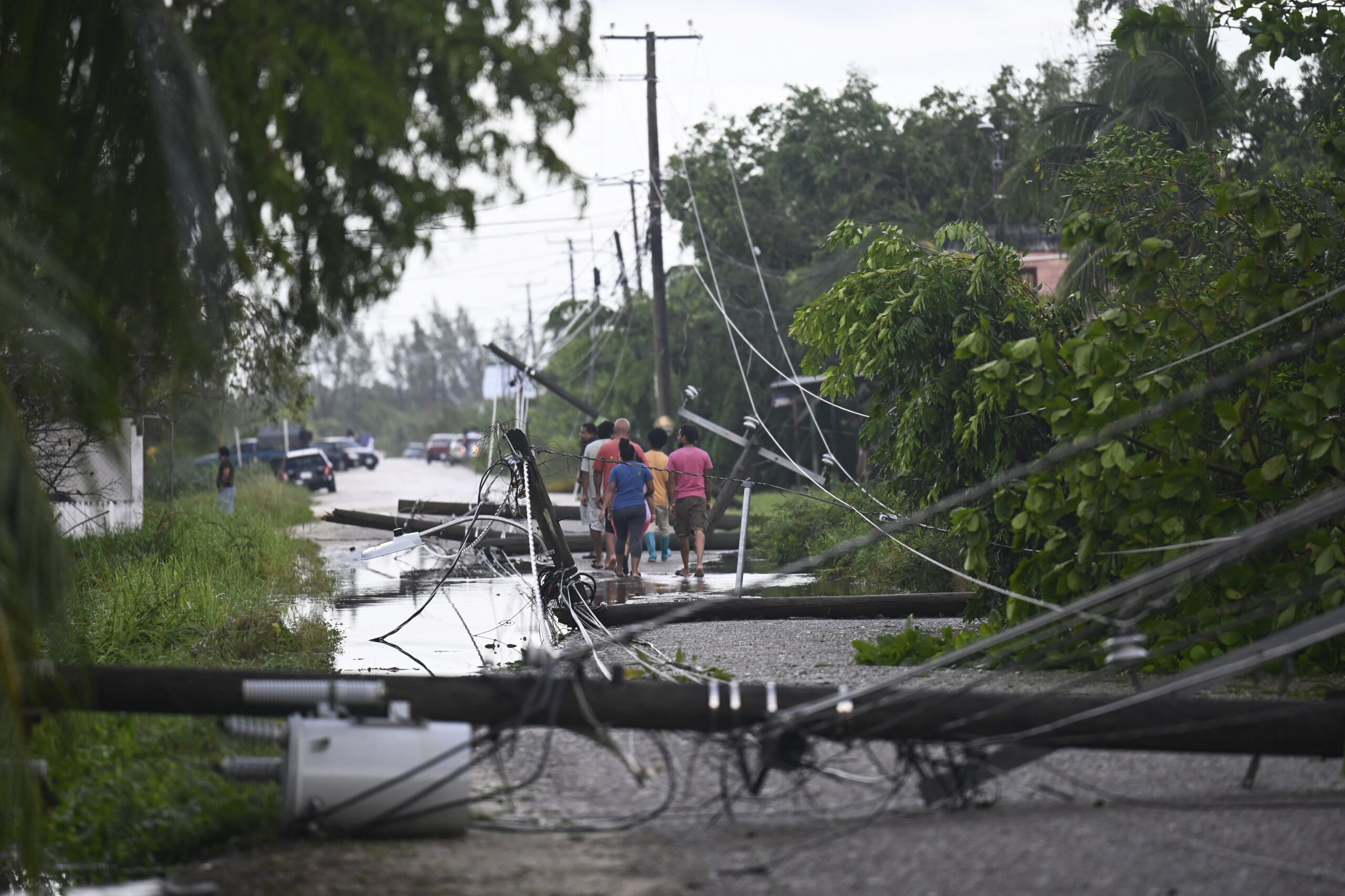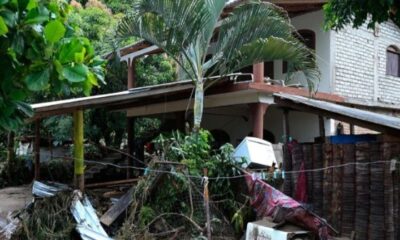Central America
Tropical Storm Lisa moves towards Mexico after lashing Belize

| By AFP |
Tropical Storm Lisa slowed on Thursday after making landfall in Belize, causing flooding and plunging parts of the country into darkness as it churned westwards toward Mexico.
Both Mexico and Belize dropped their coastal tropical storm warnings as the former hurricane weakened and headed west at 10 miles per hour (16 kilometers per hour), according to the US National Hurricane Center (NHC) in Miami.
Forecasters warned that the tourist-popular coast of Central America and the Yucatan Peninsula should continue monitoring the situation as the maximum sustained winds decreased to around 45 mph (75 kph).
For the next day or so, the storm system is expected to pack a gusty punch and deliver heavy rain, swells and flash flooding to northern Guatemala and southeastern Mexico, further weakening as it moves inland.
Lisa slammed into the Sibun River just southwest of economic hub and former capital Belize City around 2120 GMT on Wednesday, uprooting trees, downing power lines and inundating streets.
“It’s very dangerous for us” because in Belize “it floods quickly, even with moderate rain,” Jasmin Ayuso, a 21-year-old secretary, told AFP.
A state of emergency was declared in two areas, while a curfew was in effect until dawn on Thursday.
Some parts of Belize were left without power as the storm lashed the country of about 405,000 people.
“BEL is aware of power outages affecting several areas of the country,” the utility wrote on Facebook. “We assure the public that our teams are taking note of the reports of damages to the power system, including fallen power lines and poles.”
Schools and most businesses were closed in anticipation of the storm and the government set up several shelters.
In Belize City and neighboring areas, local media showed weather-battered buildings, flooded streets and yanked out trees after Lisa landed.
The storm is forecast to be further downgraded to a tropical depression by the end of the day before dissipating over Mexico.
Evacuations in Guatemala
The NHC said Lisa could drop up to 10 inches (250 millimetres) of rain in some areas of Belize, northern Guatemala and several states in southern Mexico.
The Yucatan Peninsula, Honduras’ Bay Islands and other areas of Central America were forecast to receive up to six inches of rain.
In Guatemala, heavy rain caused flooding and landslides in the northernmost department Peten on the border with Belize.
About 143 people were evacuated and 48 remain in a shelter, Oscar Cossio, secretary of the National Coordination for Disaster Reduction (CONRED), told a press conference.
Schools in the north canceled classes.
Lisa arrives not even three weeks after the passage of Julia, another Category 1 hurricane, which caused dozens of deaths in Honduras, Guatemala and El Salvador.
Lisa is the 12th named storm this season, a designation given to systems that produce winds of 39 mph (63 kph) or greater, according to the NHC.
Last year’s active Atlantic hurricane season, which officially runs from June through November, saw 21 named storms.
Central America
Washington Imposes Visa Ban on La Modelo Director Amid Crackdown in Nicaragua

The United States government announced Wednesday that it has imposed visa restrictions on Roberto Clemente Guevara Gómez, director of Nicaragua’s largest prison, La Modelo, for his involvement in actions that violate human rights.
In a statement, U.S. Secretary of State Marco Rubio said the measure is intended to promote accountability for abuses committed under what he described as the “Murillo-Ortega dictatorship” against political prisoners.
Rubio specified that Guevara Gómez was designated for participating in “a gross violation of the human rights of a political prisoner.” The sanction was issued under the 2024 Department of State, Foreign Operations, and Related Programs Appropriations Act, which bars the sanctioned individual — and potentially immediate family members — from entering the United States.
“United States demands the immediate and unconditional release of all political prisoners unjustly detained in Nicaragua,” the statement added.
Ongoing tensions between Washington and Managua
Washington rejected Nicaragua’s November 2021 elections, in which President Daniel Ortega and his wife, now co-president Rosario Murillo, were reelected while seven potential challengers were in prison.
Relations between the two countries remain tense amid expanding U.S. sanctions and increasing diplomatic pressure on the Nicaraguan government.
On January 10, marking Ortega’s 19 years in power, Nicaragua released “dozens of detainees,” including political prisoners. The move came one day after the U.S. Embassy in Managua stated that “more than 60 people” remain “unjustly detained or disappeared” in the Central American nation.
U.S. officials have continued to push for the “unconditional release” of political prisoners rather than selective or temporary releases.
Ortega, 80, governs alongside Murillo with consolidated authority, having strengthened executive power through constitutional reforms and security measures, while the opposition has been weakened by imprisonment, exile, and the revocation of citizenship and property rights.
Central America
Guatemala’s Attorney General Consuelo Porras Loses Bid for Constitutional Court Seat

Guatemala’s attorney general, Consuelo Porras, who has been sanctioned by the United States over corruption allegations, lost a key vote on Monday in which a public university selected two of the 10 magistrates for the country’s highest constitutional court. However, she could still seek a seat through another nominating body.
The election of five full magistrates and five alternates to the Corte de Constitucionalidad (CC) is taking place gradually over more than two months and is considered crucial in the ongoing struggle for control of Guatemala’s judiciary, which critics say has long been influenced by a political and economic elite accused of corruption.
According to results announced at a press conference, the governing council of the Universidad de San Carlos de Guatemala (USAC) rejected Porras, who had applied as either a full or alternate magistrate, and instead chose two candidates aligned with the university rector. The vote was held at a hotel in Antigua, about 35 kilometers from the capital.
Despite the setback, Porras — whose term as attorney general ends on May 16 — could still be nominated to the Constitutional Court by the Corte Suprema de Justicia, which appoints two magistrates. The remaining six are selected by the president, the bar association and Congress.
“It’s always a possibility,” the 72-year-old lawyer said days earlier when asked by reporters whether she would seek nomination through another institution if she lost the USAC vote.
Porras has been sanctioned by Washington and the European Union for allegedly attempting two years ago to block the inauguration of President Bernardo Arévalo and for pursuing legal actions against anti-corruption prosecutors, judges, journalists and social leaders since taking office in 2018.
The USAC vote was controversial because most members of the university’s governing council are serving beyond the expiration of their terms. Students, academics and social activists staged protests against Porras’ candidacy.
Central America
Teens visit ETESAL substation to learn about responsible energy use

Within the framework of World Energy Day, teenagers from the institutional care center Ciudad Niñez y Adolescencia (CNA), run by the Consejo Nacional de la Primera Infancia, Niñez y Adolescencia (Conapina), took part in an educational visit to a substation operated by Empresa Transmisora de El Salvador (ETESAL) in Santa Ana.
The aim of the activity was to give participants first-hand knowledge of how the country’s electricity transmission system works and to highlight the importance of responsible energy use.
During the tour, the group learned about the process that delivers electricity to homes, businesses, and industries. They were also introduced to specialized technical equipment and the safety measures required to ensure an efficient and reliable service.
Before the guided visit, the teenagers attended two informative talks and an environmental awareness session focused on the relevance of responsible energy consumption and its impact on the environment.
According to Nelson Menjívar, head of Conapina’s programs unit, the initiative serves a dual purpose. “It has two objectives: a recreational component and an educational one, so that adolescents can learn about the work carried out by ETESAL and how some of the resources they use at home are generated. This is in keeping with the guarantees established under the Crecer Juntos law; we ensure those rights for children,” he said.
Menjívar stressed that these activities help young people better understand how essential services function in their daily lives while promoting efficient consumption habits and a culture of environmental respect and care.
The event is part of the principle of shared responsibility set out in the Crecer Juntos law, promoted by the administration of Nayib Bukele, which states that families, society, private companies, and the State must work together to safeguard the comprehensive well-being of children and adolescents.
-

 International3 days ago
International3 days agoFamily of “El Mencho” Seeks Return of Body After Deadly Military Operation
-

 International3 days ago
International3 days agoLarry Summers Steps Down from Harvard Role Amid Epstein Controversy
-

 International3 days ago
International3 days agoIran’s President Optimistic Ahead of Geneva Nuclear Talks with U.S.
-

 International3 days ago
International3 days agoBill Gates Admits “Serious Mistake” Over Epstein Ties
-

 International3 days ago
International3 days agoStephen Hawking Photo Appears in Newly Released Epstein Documents
-

 International2 days ago
International2 days agoCocaine Production Surges 34% in 2023 as Market Expands into Africa and Asia
-

 International2 days ago
International2 days agoFederal Judge Blocks Trump Policy Allowing Deportations to Third Countries
-

 International2 days ago
International2 days agoClinton Accuses Republican Committee of Using Epstein Case to Shield Trump
-

 International1 day ago
International1 day agoTrump Floats “Friendly Takeover” of Cuba Amid Rising Tensions
-

 International1 day ago
International1 day agoArgentina’s Senate Reviews Milei-Backed Labor Overhaul
-

 International4 hours ago
International4 hours agoSecurity Council to Hold Emergency Meeting on Middle East Crisis
-

 Sin categoría4 hours ago
Sin categoría4 hours agoTrump: ‘We Think It’s True’ Amid Claims Iran’s Supreme Leader Was Killed






























